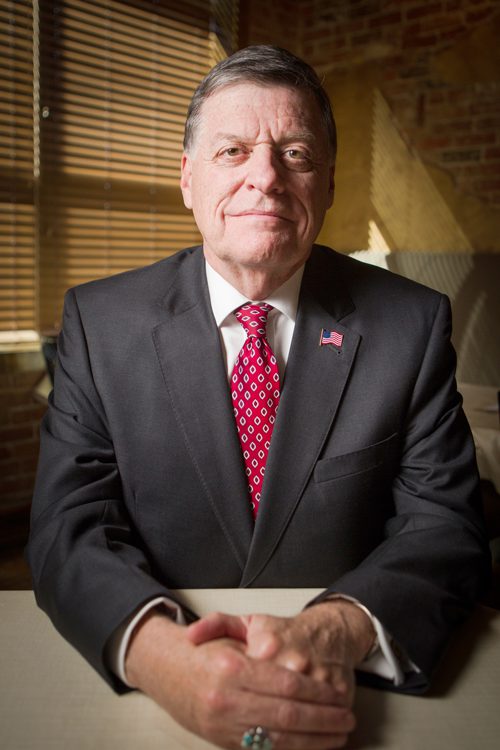
‘It was So Very Eerie for Me’
Congressman Tom Cole, U.S. Representative for Oklahoma’s 4th District, remembers clearly his first Moore tornado.
“I watched one touch down when I was playing football as a kid,” he says. “It picked up my friend’s house and moved it about 100 yards with him in it. He was 5 years old.”
Like others who have called Moore home for their entire lives, Cole and his loved ones were impacted by the 1999 tornado.
“It’s just something people here live with and grow up with,” he says, “although it’s been especially intense these past 15 years.”
The morning of May 20 was Cole’s first legislative day back in Washington, D.C. Always on the alert for spring storms in his home state, Cole’s office closely monitored the weather. But it was during a meeting with another legislator that Cole saw his hometown on CNN.
“I looked up and could see that the tornado had hit the laundry where I go, a mile from my house,” he says.
Cole skipped the scheduled votes in the House that evening as he desperately tried to reach his family and local staff to make sure they were all right and to get their personal assessments of conditions in the destruction zone. He then received a phone call from President Barack Obama.
“It was so thoughtful on his part,” Cole says. “He said, ‘Tom, I know this is your hometown. I want you to know that Michelle and I are thinking about you and your family and friends and praying for you. We will do everything we possibly can in this situation to help people on the ground.’”
The president then named the resources already in motion to help the efforts of the state and affected communities.
“People are critical about federal government, and that’s understandable,” Cole says. “But we are lucky to be Americans, because in times of disaster, the amazing resources of this country become available, and the executive branch immediately mobilizes. This is true of Tuscaloosa, Ala., Super Storm Sandy, Hurricane Katrina … in this case, the President took a special interest.”
When Cole and other Oklahoma legislators were able to return to the state – with airports closed, they resorted to commandeering a military plane – the group took a helicopter over the path of the outbreak before surveying the damage on the ground. At Plaza Towers Elementary, their first stop, Cole was particularly shaken.
“It was so very eerie for me,” he says. “I was a groundskeeper there when I was putting myself through college. It also was a polling place. I couldn’t count the number of times I’d been there. I knew every part of Moore there was to know; I’d lived there for 50 years. When I saw the destruction, I literally could not tell where I was. No visual landmarks existed anymore. The destruction was just so utter. That was a gut-wrenching moment.”
With the help of local, state and federal organizations and first responders, Cole worked vigorously to ensure the federal coordination for the disaster went as smoothly as possible. He also spent days amid the rubble of his hometown, speaking with fellow residents and helping with the cleanup efforts. One woman he met was sweeping debris from the slab of her safe room in the garage. She told Cole that she had won the federal lottery to pay for a storm room and that it had been completed three weeks before May 20.
As another neighbor picked through the ruins of his home, Cole stopped to help and asked him what he was looking for. The man replied: “My truck.”
Cole’s wife, Ellen, at home during the outbreak, rode out the monster storm in a neighbor’s safe room. The Coles had their own safe room, but it was only built to withstand an EF-3 or EF-4 tornado.
After May 20, they purchased and installed one that could withstand an EF-5.























